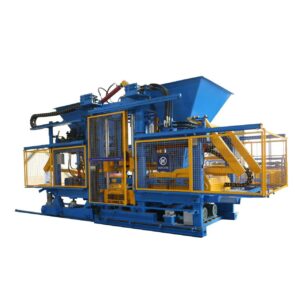Block making machines are versatile and can produce a wide range of concrete or cement blocks with varying types and sizes. The types and sizes of blocks that can be produced depend on the specific design and capabilities of the machine.
Here are some common types and sizes of blocks produced by block making machines, along with how specifications can be adjusted:
1. Standard Concrete Blocks:
- Size: Standard concrete blocks often measure 8 inches (200 mm) in height, 8 inches (200 mm) in width, and 16 inches (400 mm) in length. However, other sizes, such as 4-inch and 6-inch blocks, are also common.
- Adjustment: The machine’s mold or forming system can be changed to accommodate different block sizes. Adjusting the mold’s dimensions will result in blocks of the desired size.
2. Hollow Blocks:
- Size: Hollow blocks come in various sizes and configurations. Standard hollow blocks typically have dimensions similar to standard concrete blocks but with hollow cores that reduce weight and improve insulation.
- Adjustment: The machine’s mold can be designed with cavities to create hollow blocks, with varying sizes of cores based on design requirements.
3. Interlocking Pavers:
- Size: Interlocking pavers come in various shapes and sizes, often used for driveways, pathways, and outdoor areas. Common sizes include 4×8 inches, 6×6 inches, and 8×8 inches, but many other sizes and shapes are possible.
- Adjustment: The machine can be equipped with molds specific to the desired paver size and pattern.
4. Retaining Wall Blocks:
- Size: Retaining wall blocks are typically larger and heavier than standard blocks. They are designed to create structural retaining walls. Common sizes include 12x8x16 inches and 12x6x16 inches.
- Adjustment: The machine’s mold can be designed to create retaining wall blocks with the desired dimensions and features.
5. Decorative Blocks:
- Size: Decorative blocks come in various shapes and sizes and are used for aesthetic purposes in landscaping and architecture. These can vary widely in size, often following custom designs.
- Adjustment: Custom molds can be created to produce decorative blocks based on specific design requirements.
6. Solid Blocks:
- Size: Solid blocks do not have hollow cores and are used in load-bearing walls. They come in various sizes but are often similar to standard concrete blocks.
- Adjustment: Solid blocks can be produced using standard molds without cavities.
7. Custom Blocks:
- Size: Block making machines can be adapted to produce custom-sized and shaped blocks based on project requirements.
- Adjustment: Custom molds are created to produce unique block designs and sizes.
The specifications of the blocks are adjusted by changing the molds or forming systems in the block making machine. The mold is customized to match the dimensions and design of the desired block type. This flexibility allows block making machines to cater to a wide range of construction and landscaping needs by producing various types and sizes of blocks.
What is the primary function of a block making machine in the construction industry?
The primary function of a block making machine in the construction industry is to produce concrete or cement blocks of various types, sizes, and configurations. These blocks serve as essential building materials and are used in a wide range of construction projects. The key functions of a block making machine include:
- Block Production: The central function is to mix raw materials, compress them, and shape them into concrete or cement blocks. These blocks are used for constructing walls, foundations, partitions, pavements, and other structural and decorative elements in construction.
- Block Customization: Block making machines can be adjusted and customized to produce a variety of block types, including standard concrete blocks, hollow blocks, interlocking pavers, retaining wall blocks, decorative blocks, solid blocks, and more. This customization caters to the diverse needs of construction projects.
- Mass Production: Block making machines are capable of producing blocks in large quantities, contributing to the efficiency and speed of construction processes. This is particularly important for projects that require a substantial number of blocks.
- Consistency and Quality Control: The machines ensure uniformity in block size, shape, and quality. This consistency is crucial for maintaining the structural integrity and aesthetic appeal of the constructed elements.
- Efficiency and Cost Savings: By automating the block production process, these machines reduce manual labor requirements and lower production costs, making construction more cost-effective.
- Adaptability to Project Requirements: Block making machines can be used for various scales of projects, China blocks machine price from small-scale residential construction to large-scale commercial and infrastructure projects. They adapt to the needs of the specific construction project.
- Custom Designs: Some machines can produce custom-designed blocks, allowing for unique architectural features or landscaping elements in construction.
- Versatility: Beyond standard concrete and cement blocks, block making machines can be configured to produce other building materials such as interlocking pavers, retaining wall blocks, and decorative blocks, contributing to the versatility of the construction process.
- Sustainability: The use of concrete blocks produced by these machines can be more environmentally friendly due to the reduced need for wood or other construction materials.
- Quality Assurance: The machines often incorporate quality control mechanisms and safety features to ensure the produced blocks meet industry standards and regulatory requirements.
In summary, the primary function of a block making machine in the construction industry is to manufacture a variety of concrete or cement blocks that serve as fundamental building components. These machines contribute to the efficiency, cost-effectiveness, and quality of construction projects, making them invaluable tools in the field of construction.
